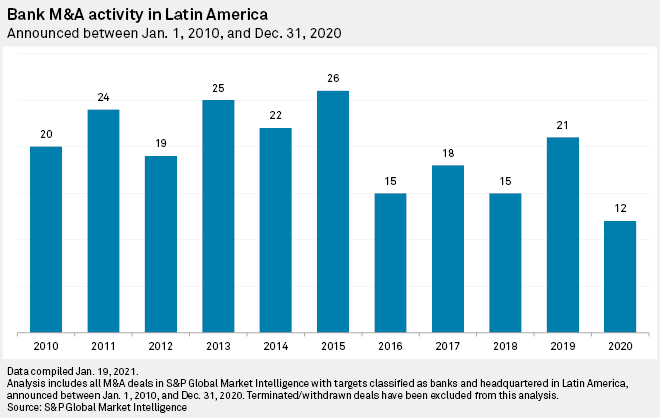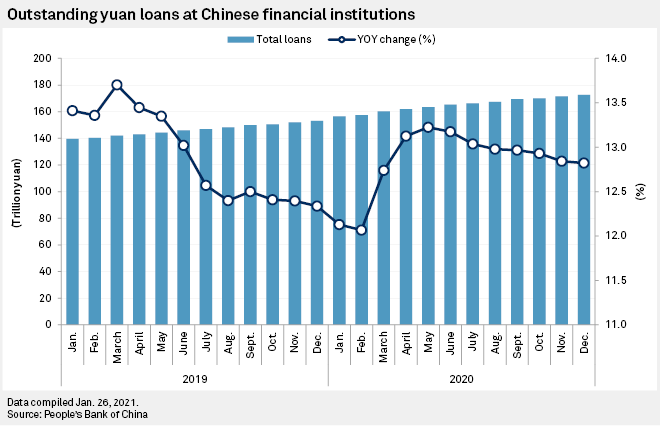S&P Global Offerings
Featured Topics
Featured Products
Events
S&P Global Offerings
Featured Topics
Featured Products
Events
S&P Global Offerings
Featured Topics
Featured Products
Events
Featured Products
Ratings & Benchmarks
By Topic
Market Insights
About S&P Global
Corporate Responsibility
Culture & Engagement
Investor Relations
Featured Products
Ratings & Benchmarks
By Topic
Market Insights
About S&P Global
Corporate Responsibility
Culture & Engagement
Investor Relations
S&P Global Offerings
Featured Topics
Featured Products
Events
Language

The world's largest banks remain in a high degree of uncertainty as the COVID-19 crisis triggered capital market volatility not experienced in more than a decade. Widespread immunization, which certain countries might achieve by midyear, will help pave the way for a return to more normal levels of social and economic activity. As the recovery takes shape, the future of banking will be primarily transformed by technological disruption and consolidation.
Published: February 16, 2021


S&P Global Ratings believes that Canada's major banks are moderately placed to deal with tech disruption risks, in part thanks to their dominant market positions.
That said, the country's banking sector is entering a period of significant change as market participants respond to new technologies and increasing customer demand for tech-driven convenience, in part fueled by the COVID-19 pandemic.
"2020 was a very quiet year," Alfredo Calvo, a bank director with S&P Global Ratings, said. "There were very good opportunities in the market, with favorable financing conditions and all, but uncertainty was just too high."
LatAm Bank M&A Drops to Decade Low as Lenders Struggle with Credit Risk
Deal-making across banks in Latin America hit a 10-year low in 2020 as lenders scrambled to contain credit risk and built buffers for upcoming loan losses.
The Latin American bank sector saw just 12 deals announced during the year, S&P Global Market Intelligence data shows, marking the slowest pace of deal-making in a decade.
"2020 was a very quiet year," Alfredo Calvo, a bank director with S&P Global Ratings, said. "There were very good opportunities in the market, with favorable financing conditions and all, but uncertainty was just too high."


The current environment is highlighting the value of scale and should encourage more bank M&A activity, including larger transactions, according to KBW CEO Tom Michaud.
The downturn in 2020 has weighed on bank M&A activity, on pace to drop 57% from year-ago levels.
Lower bank valuations certainly have not helped stoke more deal activity, but Michaud said recessions are never a good time for healthy bank M&A given concerns about credit quality.
U.S. Digital Lender Originations Expected to Rebound Strongly After Painful 2020
S&P Global Market Intelligence expects U.S. digital lender origination volumes to jump more than 20% per year over the next few years as the companies that weathered the initial shock of COVID-19 begin competing again for market share.
Read the Full ArticleFed's Tailored Approach to European Banks Will Level Playing Field in U.S.
The Federal Reserve's move to tailor the oversight of four European Global Systemically Important Banks, or G-SIBs, operating in the U.S. will level the playing field and boost their competitiveness in the markets.
Read the Full Article
S&P Global Ratings expects the COVID-19 shock and its aftermath to dominate the credit outlook for Japan's banking industry in 2021. S&P Global Ratings think the real test of banks' asset quality will come in 2021 or later. The gradual end of fiscal and monetary support measures will reveal the true impact of COVID-19 on borrowers.
Fintech Can Revive Japan's Regional Banks
Japan has introduced new measures to support ailing regional banks on condition they rationalize through consolidation or other means.
Read the Full ReportSingapore's Banks May Hold Their Own Against New Digital-Only Challengers
Singapore's four new digital lenders will likely leverage on their existing businesses to carve a share in the island nation's busy banking space where dominant local players already have a head start in engaging with customers online.
Read the Full Article
Chinese banks are likely to see credit growth continuing to slow in 2021, as the government steps up measures to rein in mortgage lending and consumer loans and may at some point start to wind down COVID-19 stimulus measures, analysts say.
China G-SIBs Unlikely to Trigger Lehman-Like Global Financial Crisis
Despite rising global systemic risk scores of Chinese megabanks, their predominantly domestic footprint and the limited overseas use of the yuan suggest a low likelihood of them triggering a Lehman-like global financial crisis in an event of a bank failure, experts say.
Read the Full ArticleThe Future Of Banking: China's Digital Renminbi Could Hit Payment Platforms
China is the first G-20 country to trial a digital currency. S&P Global Ratings believes any success or failures will offer lessons to other aspiring nations.
Read the Full Report
In the wake of COVID-19, European banks face an even longer period of margin compression resulting from ultra-low interest rates and flat yield curves. Approaching the seventh anniversary of the European Central Bank's (ECB's) negative interest rate policy, low inflation means that rate hikes remain a distant prospect right across Europe, even when economies begin to recover from the pandemic.
S&P Global Ratings observes that margin erosion accelerated following the onset of COVID-19 due to strong deposit inflows and the launch of government-guaranteed loan programs. However, the resulting boost to interest-earning assets mitigated the hit to revenues.
The ECB has additionally shielded eurozone banks' profitability through cheap long-term refinancing operations and tiered interest rates on reserves. Nevertheless, there is a clear downside risk to the sector's revenues and earnings if it becomes less adept at mitigating the adverse side effects of prolonged expansionary monetary policies.
ECB Has Acted Over Banks' Highly Leveraged Loan Exposures, says Enria
The European Central Bank's top supervisor has said the central bank has clamped down on banks it considers overexposed to the leveraged loan market, resulting in increased capital charges.
Read the Full ArticleEuropean Banks' 2021 Stress Test Contemplates A Tough Adverse Macroeconomic Scenario
The European Banking Authority (EBA) has formally launched its 2021 stress test for banks. The results will be published by July 31, 2021.
Read the Full ReportUK Banks' Deposits Rise Amid Pandemic, but Margins Likely to be Squeezed
British banks are expected to make extensive use of cheap Bank of England loans in the next few months even as deposits from businesses and households rise amid the pandemic, according to analysts.
Read the Full Article
The COVID-19 pandemic pushed most economies in North Africa and Jordan into a deep recession in 2020, while Egypt saw its economy significantly slow down.
Extraordinary fiscal and monetary measures preserved banks' credit quality in 2020, but S&P Global now expects their gradual phasing-out to reveal the real impact of COVID-19 on banks' asset quality.
S&P Global expects a sharp increase in problematic loans and credit losses for most North African and Jordanian banking systems. S&P Global believes that most rated banks will be able to absorb the shock without hampering their capital base. A few banks, particularly in Tunisia, might be showing losses.
Nigeria's Financial Services Law Ushers in Tighter Controls of Banks, Fintechs
Nigeria's new financial services law will increase regulatory demands on financial technology companies, place greater scrutiny on bank executives and deter unsecured lending to small businesses — and industry experts are divided over how well it will work.
Read the Full ArticleMEA Banking Stories to Watch in 2021: Green Financing, Lebanon, Kenya
Green sukuk and bond issuance in the Middle East and North Africa region will likely increase in 2021 as governments and state-linked companies seek to diversify their financing sources and take advantage of falling pricing.
Read the Full ArticleDelayed Lebanese Bank Earnings Reveal Extent of Country's Woes
Lebanese banks' long-awaited 2020 earnings statements reveal the disastrous consequences — for shareholders and customers alike — of their reliance on investing in government debt to make profits.
Read the Full Article
The COVID-19 pandemic and its aftermath will continue to dominate the credit story for emerging markets in 2021.
Given the exceptionally low interest rates in several developed markets, S&P Global expect banks in emerging markets with sound credit fundamentals to retain good access to international capital markets.
India Central Bank's Latest Stress Tests Ring Alarm Bells for Some Lenders
As forbearance measures to help businesses and individuals survive the pandemic end on March 31, analysts expect nonperforming assets to spike later this year.
Read the Full ArticleBad Loans, Capital May be Key Challenges for India's State-Owned Banks in 2021
An expected surge in bad loans in India's banking sector this year could hit state-owned lenders harder than their more-nimble private-sector rivals.
Read the Full Article







